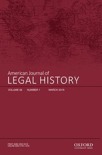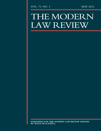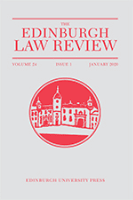
Comparative Legal History
Scope & Guideline
Bridging Past and Present in Legal Studies.
Introduction
Aims and Scopes
- Comparative Legal Analysis:
The journal focuses on comparative law as a method to understand diverse legal systems, facilitating insights into how legal principles evolve and how they are applied across various jurisdictions. - Historical Contextualization:
It emphasizes the importance of historical context in understanding legal development, examining how historical events, cultural shifts, and social dynamics shape legal systems. - Interdisciplinary Approaches:
The journal encourages interdisciplinary research, integrating perspectives from history, sociology, political science, and anthropology to enrich the understanding of legal phenomena. - Global Perspectives:
A core aim is to provide a global perspective on legal history, analyzing legal developments beyond Western-centric narratives and incorporating non-Western legal traditions and histories. - Focus on Legal Transitions and Transformations:
The journal often explores periods of significant legal transition, such as colonialism, revolutions, and legal reforms, to understand the dynamics of legal change.
Trending and Emerging
- Globalization and Legal Interactions:
There is an increasing focus on how globalization influences legal systems, including the examination of international law and cross-border legal practices that highlight interconnectedness. - Legal Responses to Social Justice Issues:
Emerging themes include the exploration of legal frameworks in relation to social justice movements, reflecting a growing interest in how law addresses issues of equality, rights, and societal change. - Environmental Law and History:
Papers are increasingly addressing the historical dimensions of environmental law, investigating how legal systems have evolved in response to environmental challenges and sustainability. - Colonial and Post-Colonial Legal Histories:
Research on colonial and post-colonial legal histories is gaining traction, emphasizing the impact of colonialism on contemporary legal frameworks and the legacies of legal systems in formerly colonized regions. - Interdisciplinary Legal Studies:
The trend of integrating methodologies from other disciplines, such as anthropology and sociology, into legal history research is on the rise, promoting a more nuanced understanding of legal phenomena.
Declining or Waning
- Traditional Legal Doctrines:
There has been a noticeable decrease in papers focusing on traditional legal doctrines without a comparative or historical context, as the journal shifts toward more dynamic and interdisciplinary approaches. - Narrow Jurisdictional Studies:
Research limited to single jurisdictions has become less common, with a growing preference for comparative analyses that span multiple legal systems, indicating a waning interest in isolated legal histories. - Descriptive Legal Histories:
The journal appears to be moving away from purely descriptive legal histories that lack analytical depth, favoring studies that engage with theoretical frameworks and critical analysis. - Static Legal Traditions:
Themes that examine static legal traditions without considering their interactions with global legal trends are declining, as the journal emphasizes more fluid and evolving legal narratives. - Overly Focused National Histories:
Papers that concentrate excessively on national legal histories, detached from broader comparative contexts, are becoming less frequent, reflecting a shift towards more integrative studies.
Similar Journals

University of Western Australia Law Review
Connecting Scholars and Practitioners in Legal ResearchThe University of Western Australia Law Review is a prestigious academic journal dedicated to the critical examination and exploration of legal issues in Australia and beyond. Published by the Law School of the University of Western Australia, this journal has become a significant resource for legal scholars, practitioners, and students alike, contributing to the rich discourse in the field of law. With an ISSN of 0042-0328 and a current categorization in the Q3 quartile in the field of Law as per the 2023 rankings, it stands among a cohort of respected legal publications. The journal, though not open access, facilitates a sharing of unique insights and research from 2019 to 2024, aiming to address emerging and traditional legal challenges within a global context. With a Scopus rank of #651 out of 1025 in Social Sciences Law, it holds a percentile of 36, reflecting its valuable contributions to legal scholarship. The University of Western Australia Law Review invites researchers, practitioners, and students to engage with its rich content and to contribute to the ongoing dialogue shaping the future of law.

Lexonomica
Bridging Legal Theory and Socio-Economic InsightsLexonomica is an influential academic journal published by UNIV MARIBOR, FAC LAW, dedicated to the field of legal studies and its intersections with socio-economic issues. With a commitment to fostering scholarly communication, Lexonomica offers a platform for researchers, practitioners, and students to disseminate their findings and insights on contemporary legal matters, policy analysis, and theoretical developments. Although currently not an open access journal, it plays a pivotal role in contributing to the academic dialogue within the legal community, as evidenced by its unique ISSN (1855-7147) and E-ISSN (1855-7155). The journal aspires to promote high-quality research and facilitate the understanding of legal phenomena in a globalized context, underlining its importance for those seeking to engage critically with the law in an ever-evolving landscape. The journal's address is located in beautiful Maribor, Slovenia, symbolizing a rich tradition of legal education and research.

AMERICAN JOURNAL OF LEGAL HISTORY
Illuminating Legal Traditions Through TimeAmerican Journal of Legal History, published by Oxford University Press, is a distinguished periodical dedicated to advancing the study of legal history. With an ISSN of 0002-9319 and an E-ISSN of 2161-797X, this journal has been a vital resource for legal historians and scholars interested in the interplay between law and societal developments since its inception. Covering significant converged years from 1976 to 2024, the journal promotes a comprehensive understanding of legal traditions and historical context, appealing to those in both the History (Q3) and Law (Q4) categories as measured by recent quartile assessments. The journal ranks respectably in Scopus, with the field of Arts and Humanities – History at rank 935 and Social Sciences – Law at rank 788, making it a critical tool for researchers, professionals, and students seeking to deepen their understanding of legal systems over time. Although it is not an open-access journal, its invaluable insights into legal history render it a necessary read for those looking to enrich their academic pursuits.

MODERN LAW REVIEW
Illuminating Modern Legal Challenges and Innovations.MODERN LAW REVIEW, a prestigious academic journal published by Wiley, stands as a significant platform in the field of law, dedicated to exploring contemporary legal issues and fostering scholarly discourse since its inception in 1937. With an impressive Scopus Rank of #237 out of 1025 in the Social Sciences - Law category, placing it in the 76th percentile, the journal has consistently maintained a reputation for high-quality research, currently positioned in Q2 of the category quartiles as of 2023. The journal's comprehensive coverage spans various legal topics, making it essential reading for legal scholars, practitioners, and students alike. Although it is not an open-access journal, its contributions are invaluable for guiding the future of legal scholarship. With a robust history of converged years from 1995, 1997 to 1999, 2001 to 2002, 2004, and 2011 to 2024, MODERN LAW REVIEW remains at the forefront of legal research, addressing pressing issues and influencing legal thought across disciplines.

Vestnik Permskogo Universiteta-Juridicheskie Nauki
Illuminating the Path of Contemporary Legal DiscourseVestnik Permskogo Universiteta-Juridicheskie Nauki, published by the Perm State National Research University, serves as a prominent platform for the dissemination of legal scholarship since its inception. With an Open Access policy implemented in 2009, this journal offers a wide range of legal studies, including comparative law, constitutional law, and international law, making it an essential resource for researchers, academics, and practitioners in the field. Although it is a relatively young publication, its commitment to quality and accessibility has established it as a respected voice in jurisprudence, contributing significantly to both national and international legal discourse. Researchers and students alike will find valuable insights within its pages, encompassing the latest developments and theoretical advancements within Russian and global legal systems. For those looking to stay informed on current legal issues and academic debates, this journal is a must-read.

Tsinghua China Law Review
Advancing legal scholarship through critical insights.Tsinghua China Law Review is an esteemed academic journal published by the Tsinghua University School of Law in China, dedicated to advancing the field of law through rigorous scholarly analysis and critical discourse. Established in 2019, this journal has carved a niche for itself within the legal community, striving to cover pertinent issues in Chinese law and its intersections with global legal trends. Although it retains an H-index disclaim and has discontinued its coverage in Scopus after 2024, it continues to provide a platform for innovative research and thought-provoking essays. Recognized for its contributions, it is categorized as Q4 in Law based on the latest ranking, positioning it at a pivotal juncture for emerging scholars aiming to make their mark within the legal scholarship landscape. With open access options limited, Tsinghua China Law Review remains a valuable resource for researchers, professionals, and students eager to engage with contemporary legal issues that shape society in an increasingly interconnected world.

AMERICAN JOURNAL OF COMPARATIVE LAW
Unraveling the Tapestry of International LawAmerican Journal of Comparative Law is a premier scholarly publication dedicated to the field of comparative law, published by Oxford University Press. Established in 1974, the journal has consistently served as a vital resource for researchers, practitioners, and students seeking insights into the legal systems across different jurisdictions. With an impressive ranking of Q3 in both the Law and Miscellaneous Social Sciences categories for 2023, it reflects a solid position in the academic landscape, ranking 400 out of 1025 in the Scopus database, placing it in the 61st percentile. The journal offers comprehensive analyses and discussions that foster understanding and dialogue around legal principles and practices, making it an invaluable tool for those involved in legal scholarship or practice. While it does not currently offer open access, the journal's commitment to high-quality, peer-reviewed content ensures that it continues to be a pivotal outlet for legal research and comparative studies.

Edinburgh Law Review
Fostering critical dialogue in law and cultural studies since 1997.Edinburgh Law Review is a distinguished journal published by Edinburgh University Press, dedicated to advancing discourse in the realm of law, cultural studies, and history. With its ISSN 1364-9809 and E-ISSN 1755-1692, this journal has been contributing valuable scholarly content since its inception in 1997, and it continues to be a vital resource for researchers, legal practitioners, and students alike. Although it currently does not provide Open Access options, the journal's rigorous peer-review process ensures that each article meets the highest academic standards. Known for its diverse range of topics, the Edinburgh Law Review holds a Q4 ranking within its categories in Cultural Studies, History, and Law in 2023, reflecting a commitment to engaging with contemporary issues in these fields. With a noticeable presence in Scopus rankings, this journal is essential for those seeking to deepen their understanding of the intersections of law, culture, and history within a British context.

Utrecht Journal of International and European Law
Championing Open Access to Legal KnowledgeUtrecht Journal of International and European Law, published by UBIQUITY PRESS LTD, serves as a dynamic platform for the dissemination of scholarly research in the realms of international and European law. Since its inception as an open-access journal in 2013, it has provided unrestricted access to cutting-edge legal scholarship, fostering global dialogue among legal professionals, researchers, and students. With a notable Scopus rank of 249 out of 1,025 in the law category and a commendable Q3 rating, the journal emphasizes innovative legal theories and practices relevant to contemporary global challenges. Located in the heart of the United Kingdom, the Utrecht Journal is committed to maintaining high academic standards while also promoting the exchange of knowledge across borders, which is crucial given the ever-evolving landscape of international law. As it converges its focus from 2020 to 2024, the journal seeks to become an essential reference for those dedicated to the exploration and expansion of legal discourse in this vital field.

Journal of International and Comparative Law
Cultivating Knowledge for Legal InnovatorsThe Journal of International and Comparative Law is a premier academic publication dedicated to advancing knowledge and sparking critical discourse in the field of law. Published by SWEET & MAXWELL, this journal aims to bridge the gap between international legal standards and comparative practices, making it an essential resource for legal scholars, practitioners, and students alike. With an impact factor that positions it in the Q3 category of legal journals and a Scopus rank of #534 out of 1025 in the Social Sciences - Law category, it is recognized for its contribution to the legal community since its inception in 2018. The journal, based in Hong Kong, seeks to publish high-quality, peer-reviewed articles that reflect a diverse range of legal perspectives and methodologies. Although the journal is not open access, it remains committed to disseminating vital research and case studies that shape contemporary legal paradigms. Scholars and legal professionals can stay informed on authoritative insights by engaging with this important resource until 2024 and beyond.